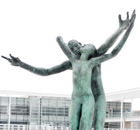-
-
China Daily E-paper
Op-Ed Contributors
The state of Cross-Straits relations
By Chih-Yu Shih (China Daily)
Updated: 2010-04-14 08:21
 |
Large Medium Small |
Although the breakthrough meeting in 2005 between Hu Jintao and Lien Chan opened a window of opportunity for greater exchanges across the Taiwan Straits and impressive changes have taken place on a business and people-to-people level, the optimism of many columnists on the political relations across the Taiwan Straits may be premature.
The breakthrough meeting in 2005 between Hu Jintao and Lien Chan, representing the Communist Party of China and the Kuomingtang (KMT) respectively, opened a window of opportunity for greater exchanges across the Taiwan Straits.
Despite the continued reluctance of the Ma Ying-jeou government in Taipei to answer Beijing's call for political reconciliation between the two sides, impressive changes have taken place on a business and people-to-people level.
On the fifth anniversary of the reconciliation of the two parties - for the first time since the end of the Chinese civil war in 1949 - the optimism of many columnists on the political relations across the Taiwan Straits may be premature.
The leadership in Taipei is reluctant to address the issue of the political reunification of Taiwan and the mainland lest it jeopardize its already fragile popularity.
Lien was able to win Hu's trust as he is not tied to the present KMT leadership. Upon Lien's advice, Hu has become much more empathic with the reservations expressed in Taiwan about political reunification. Hu has consistently stressed patience and policy changes aimed at winning over the people on Taiwan.
Ma Ying-jeou, who is also the present KMT chairman, may find the teamwork between Lien and Hu rather perplexing.
His policy suggests that he welcomes enhanced cross-Straits relations as long as it does not affect his political agenda, which focuses primarily on his campaign for re-election in 2012.
Internal political considerations have made Ma's government extremely cautious on the issue of cross-Straits political reconciliation. The DPP has used an anti-mainland tone in all its campaigns and has linked all issues to Ma's being the son of a late pro-unification KMT official. As a result, Ma faces enormous psychological pressure and refuses policy debates with the DPP.
At one time, Ma's no-debate style was a fine contrast to the mainland-bashing rhetoric of former DPP leader Chen Shuibian, who is now in prison for embezzlement. Now it has become a liability. Ma's government has lost the ability to communicate with its constituency on both general political issues and cross-Straits exchanges.
To make things worse, Ma has been incapable of maitaining good public relations with Washington, despite the widespread impression that Taipei has an upper hand in the US. This has also affected Ma's credibility among his supporters and his ability to act on cross-Straits affairs.
Ma's pro-mainland supporters have recently broken their silence and severely criticized him for his reluctance to take an initiative, much less respond with some positive feedback to the invitation to reconcilie with Beijing.
Ma used to enjoy such criticism as it enabled him to show that he was not pro-mainland. However, the poor turnout of pro-mainland supporters at local elections, resulting in the defeat of KMT candidates, in traditional KMT strongholds, sends a strong warning that they may likewise choose not to re-elect Ma in 2012. Whether Ma will decide to tilt further toward a pro-independence platform to make up the loss or to try strike a balance by alternatively placating both pro-mainland and pro-independence positions leaves the future of cross-Straits politics up in the air.
What remain promising are the growing grassroots exchanges across the Taiwan Straits. While both Beijing and Taipei emphasize economics, there is a deeper impact in the social and cultural spheres. These include not only family reunions, tourism, education, and academic exchanges, but also, more importantly, marriages that are producing a new generation of cross-Straits children.
In terms of cross-Straits political reconciliation, the Hu-Lien meeting of 2005 did not go that far. However, it has allowed the social and cultural integration of the two sides to gain policy legitimacy and public recognition.
The author is professor of political science, Taiwan University.
(China Daily 04/14/2010 page9)













